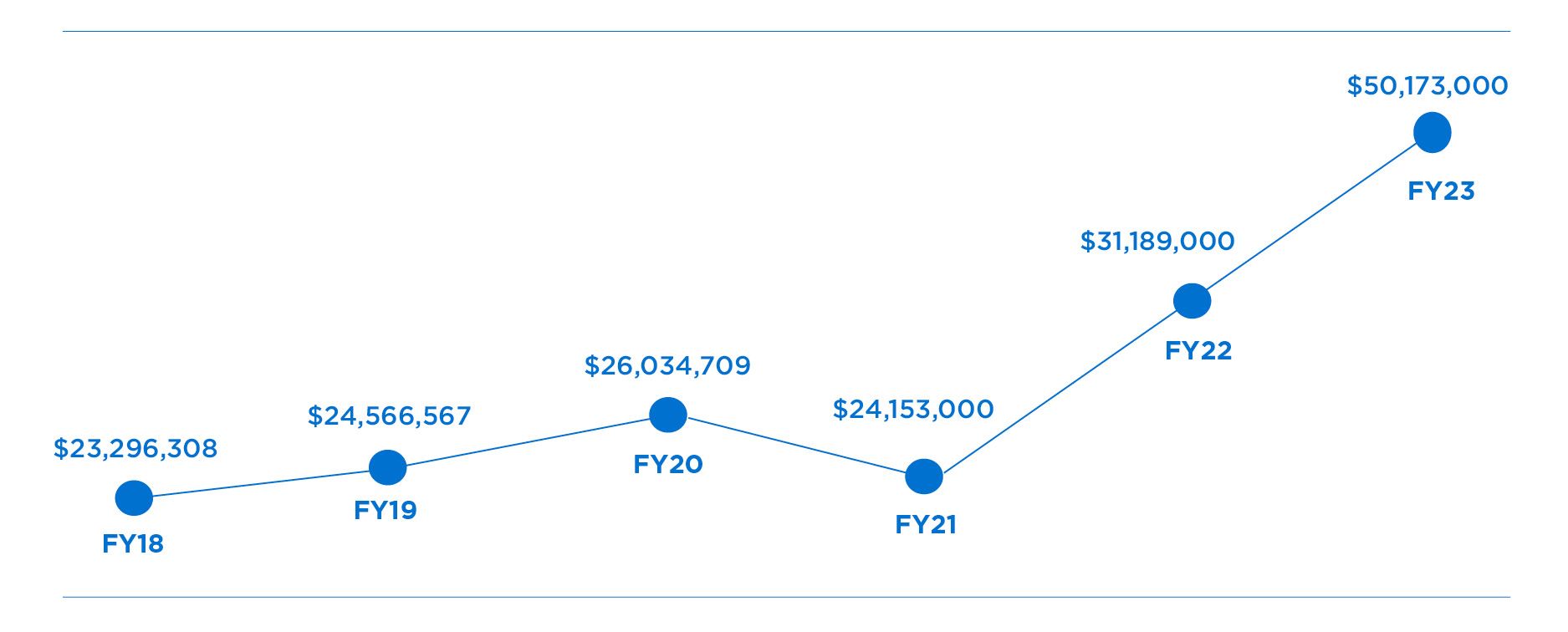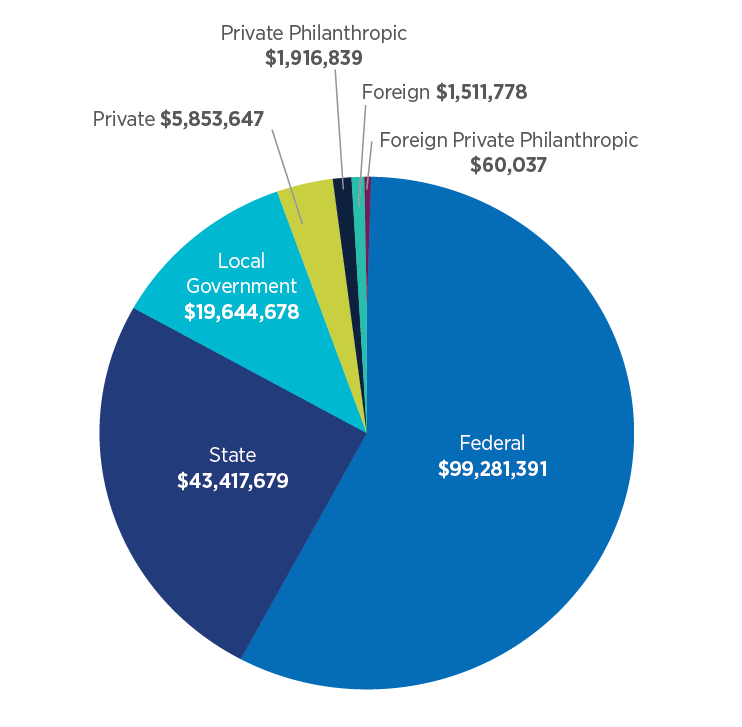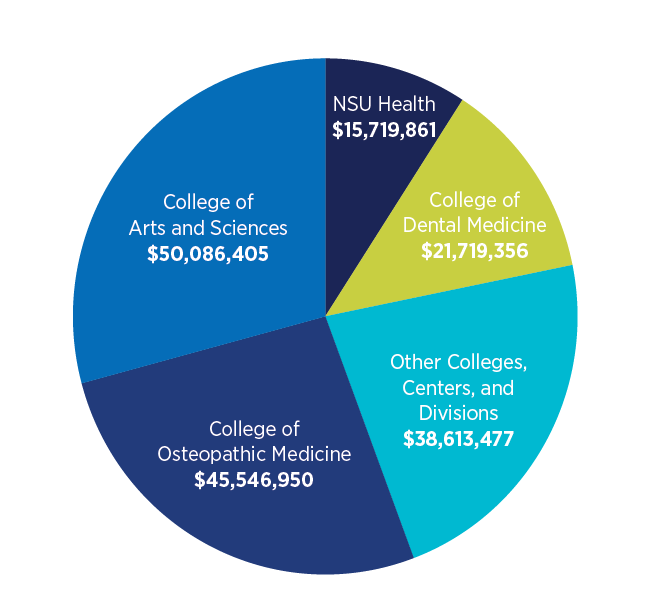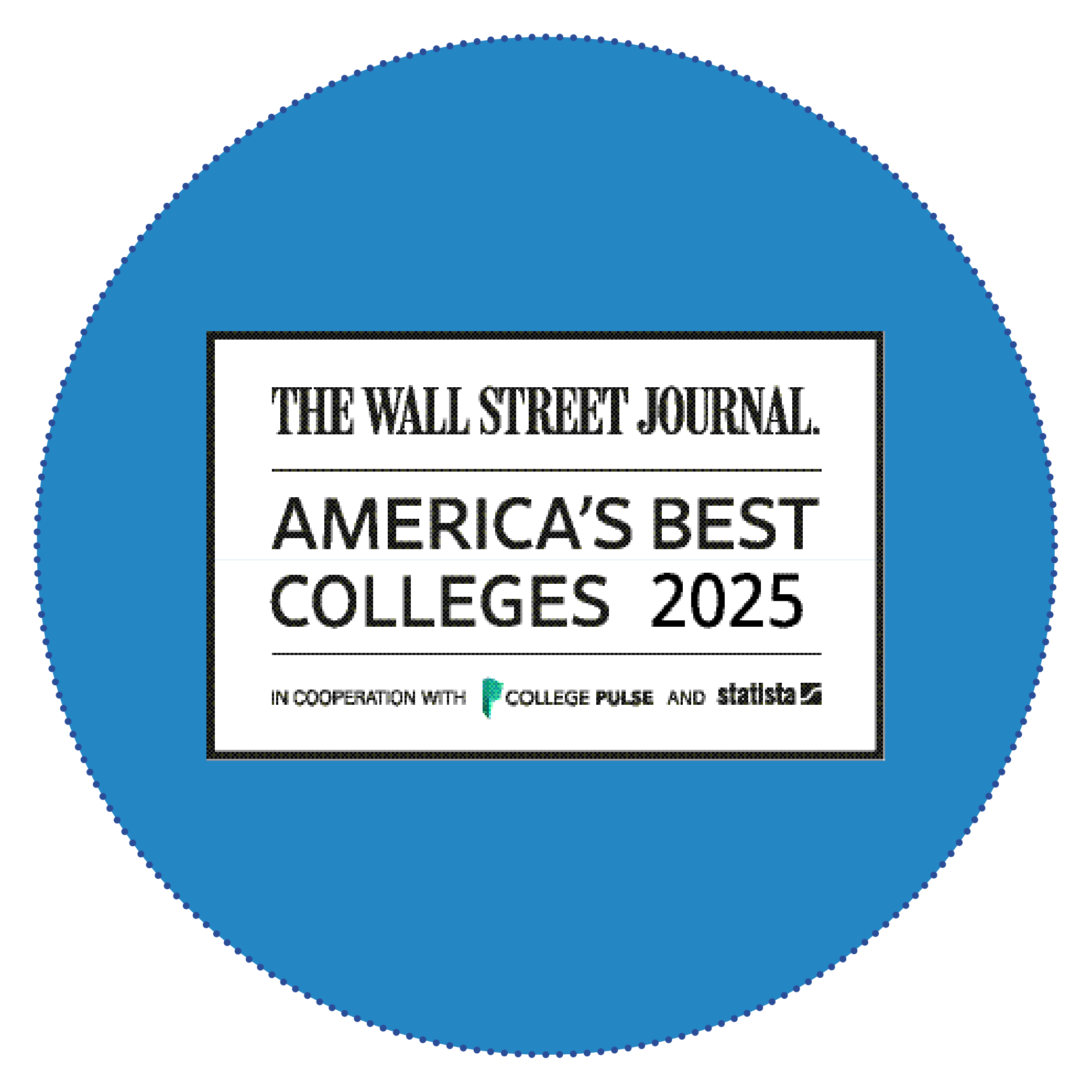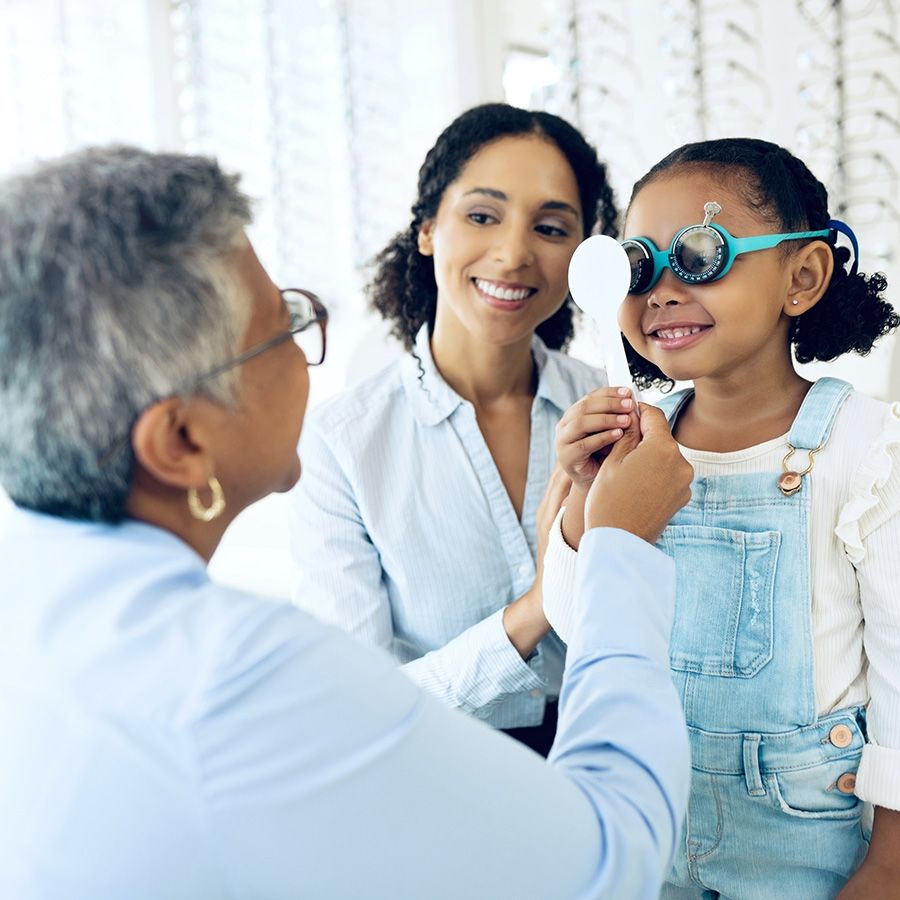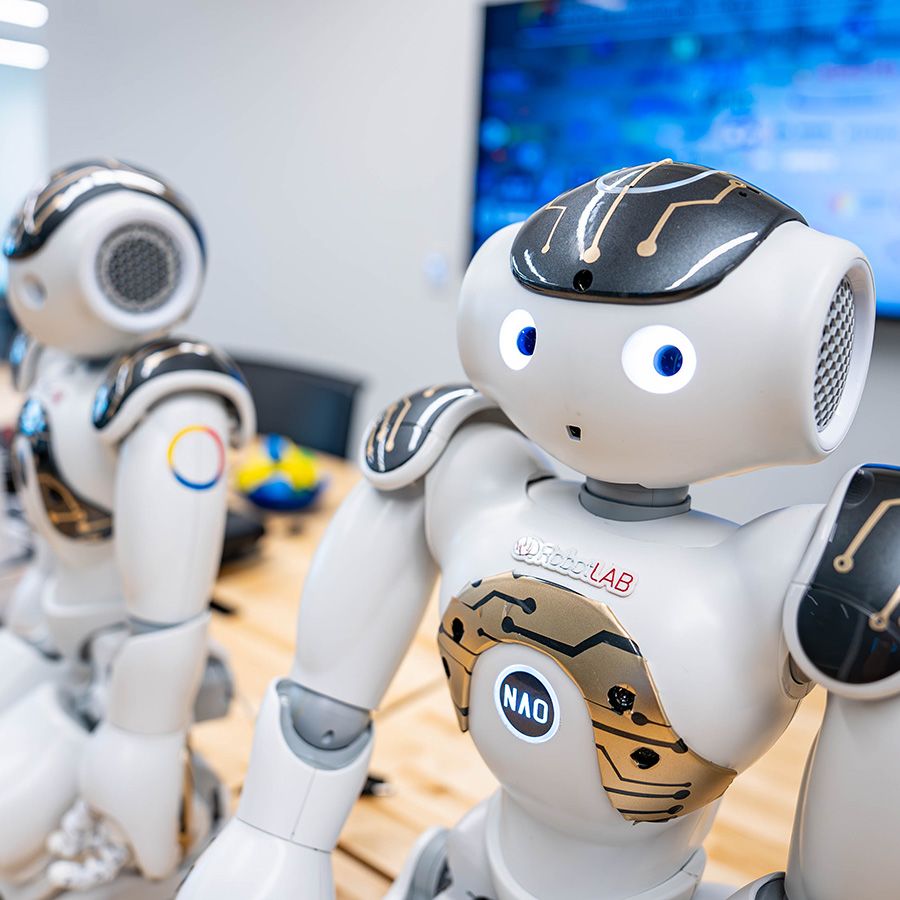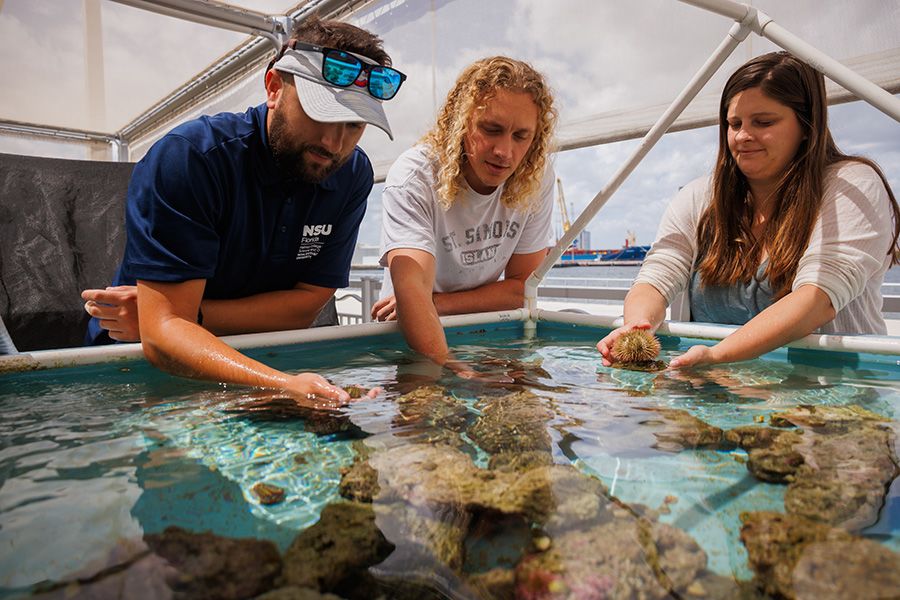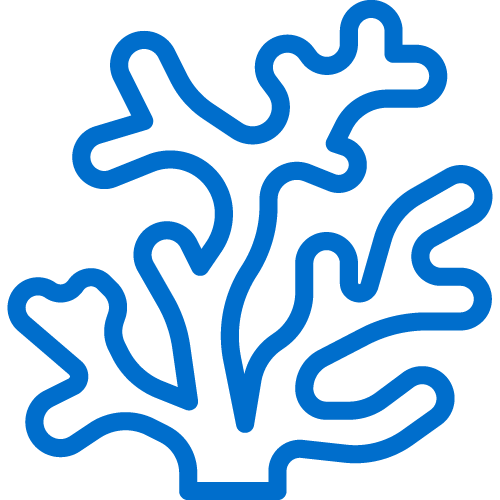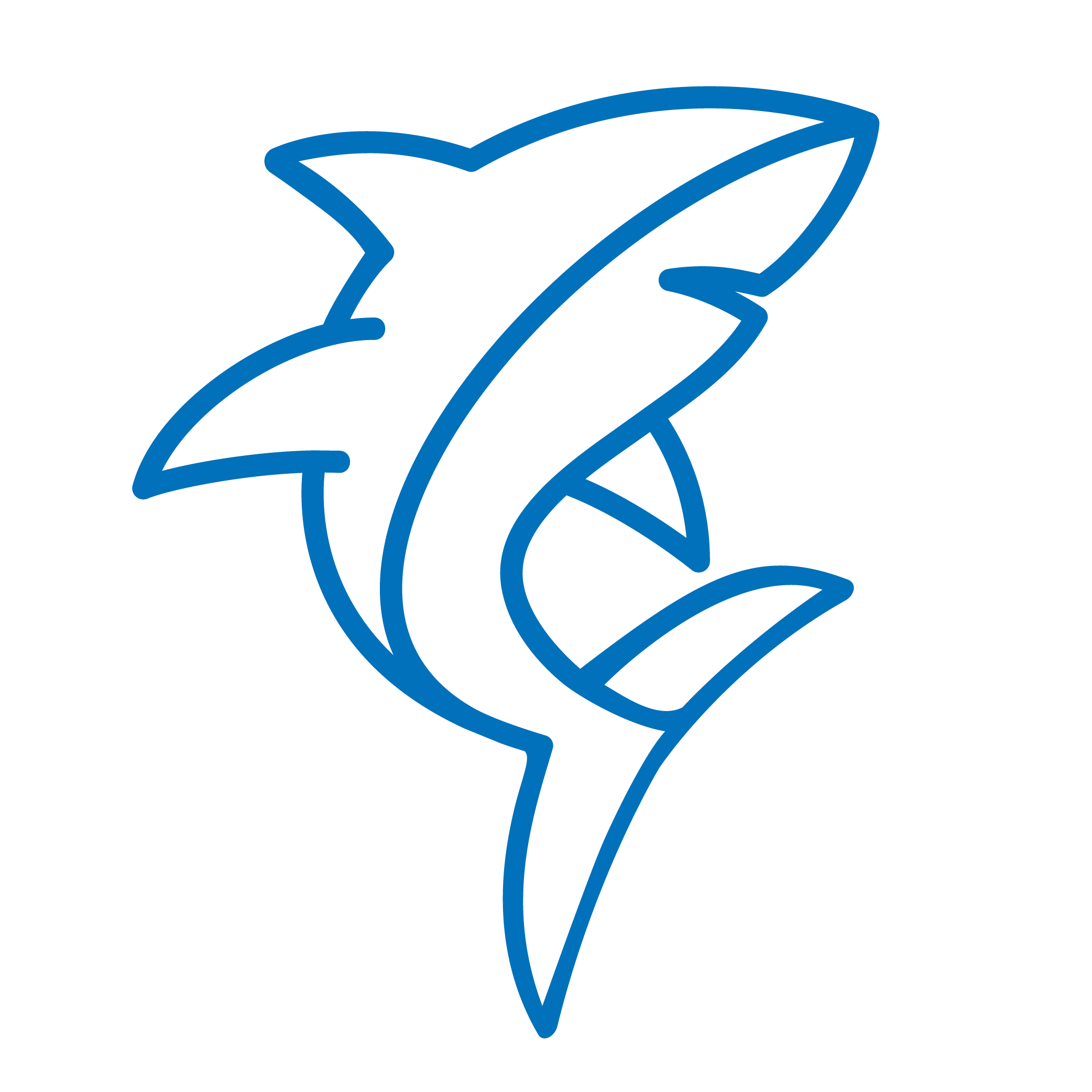NSU RESEARCH IS R1
Trailblazers. Innovators. Pioneers of Discovery.
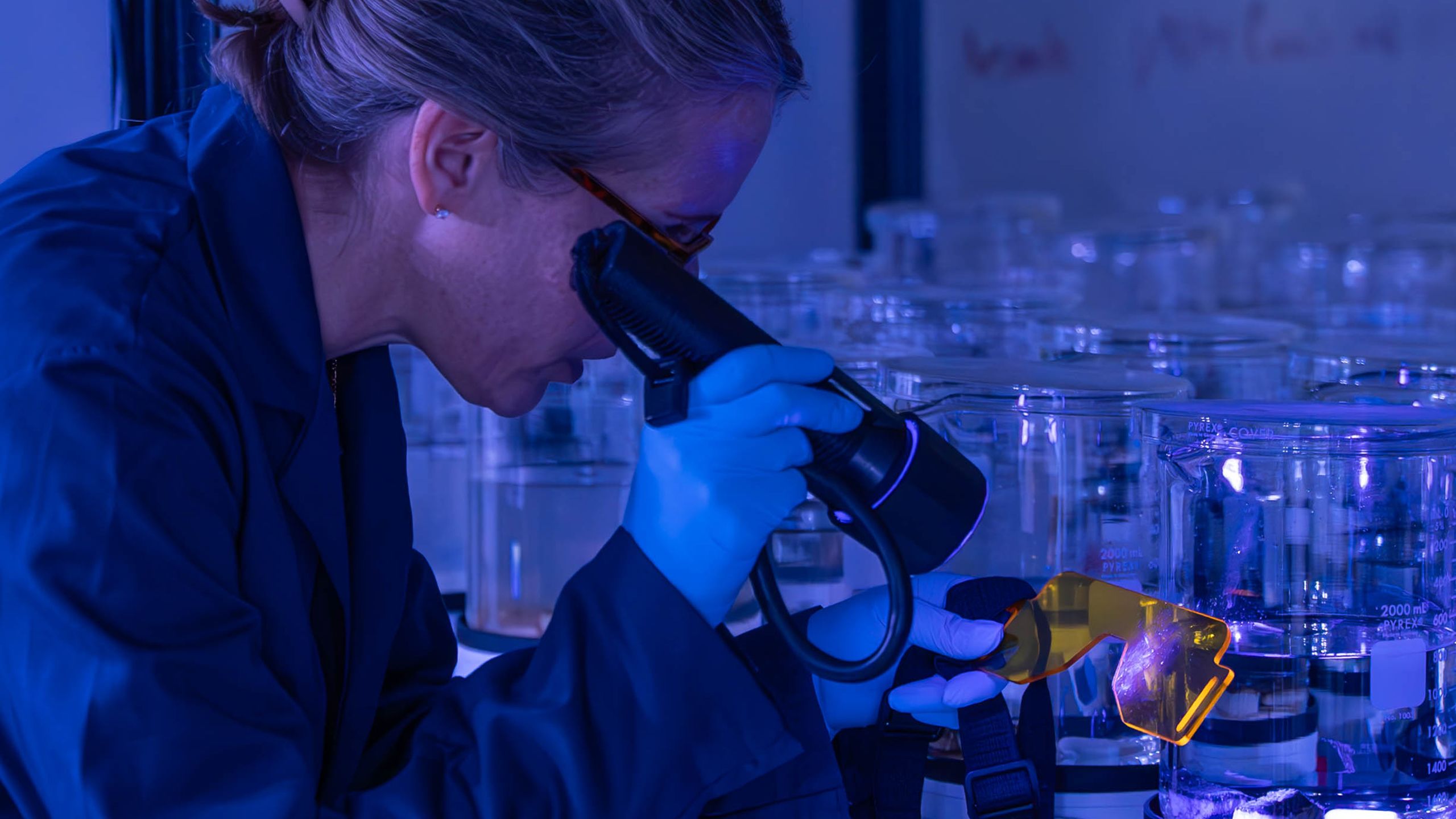
NSU IS AN R1 RESEARCH INSTITUTION
A Transformative Milestone
Nova Southeastern University (NSU) is on the cusp of one of the greatest milestones in its history. As of February 13, 2025, NSU joined the ranks of the nation’s leading research universities to attain the Carnegie Foundation’s designation as a top-tier, R1 research institution.
Anyone who has ever worked to make a significant discovery, treat a challenging condition, or launch innovative ventures in higher education knows that milestones like these are never achieved by any one person in isolation.
The story of what makes NSU an R1 university is the story of pioneering experts in a vast range of disciplines, collectively and collaboratively engaging in research to solve challenges and build a better world. NSU aims to not only investigate new frontiers in health care, technology, and mental health, but to translate the discoveries of the lab into real-world applications that touch people’s lives in Florida, across the nation, and around the rest of the world. This mission is supported by our leadership team, our funding partners, and our generous donors.
Top-tier research of this kind is only possible with cutting-edge facilities to power the imaginations of our dedicated faculty and inquisitive students. NSU’s state-of-the-art clinics, laboratories, and institutes are among the most advanced in the Southeast and the United States. And with our focus on workforce development equipping professionals for next-generation challenges in health care, marine science, and business, NSU’s reach travels far afield of our campuses. The university is the largest educator of physicians in Florida, and our impact is poised to extend well beyond the current $5 billion economic influence in the state.
NSU is proud to congratulate its 1,000+ faculty, 22,000+ students, 14 colleges, and 216,000+ alumni on achieving the Carnegie Foundation’s highest R1 classification. Together, our experts in clinical care, education, research, and innovation are cementing NSU among the top research universities in the U.S.
We hope you’ll join us in this next transformative chapter.
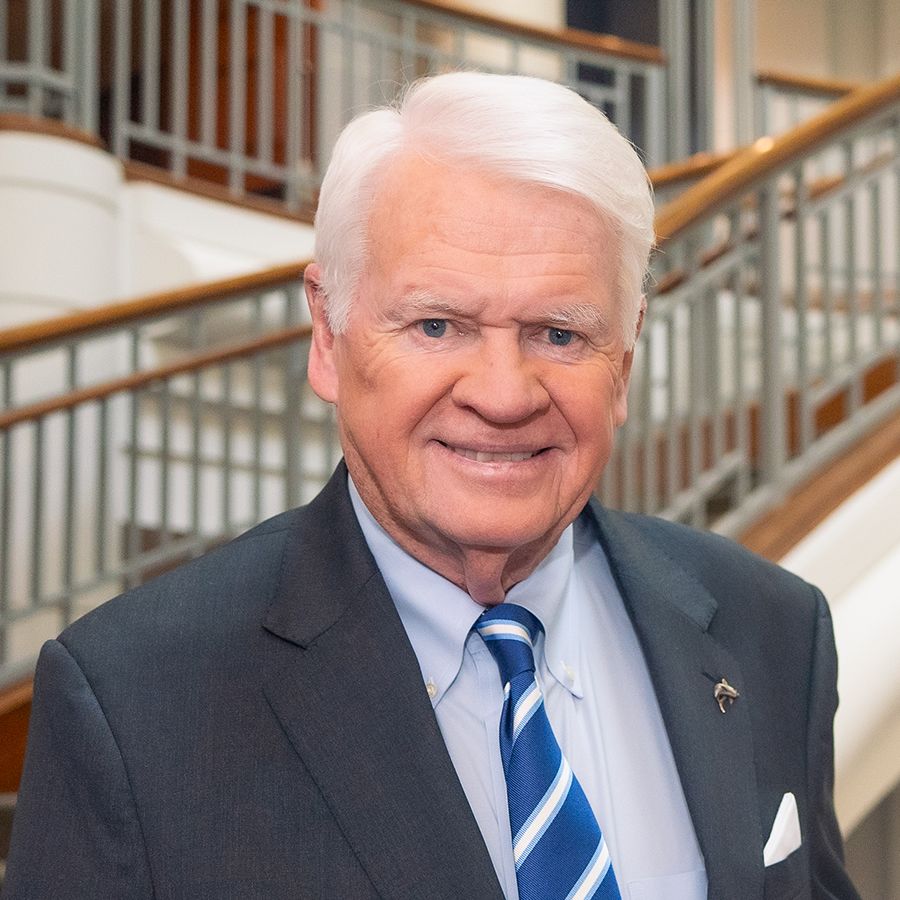
HARRY K. MOON, M.D., FACS, FRCSEd
President and CEO
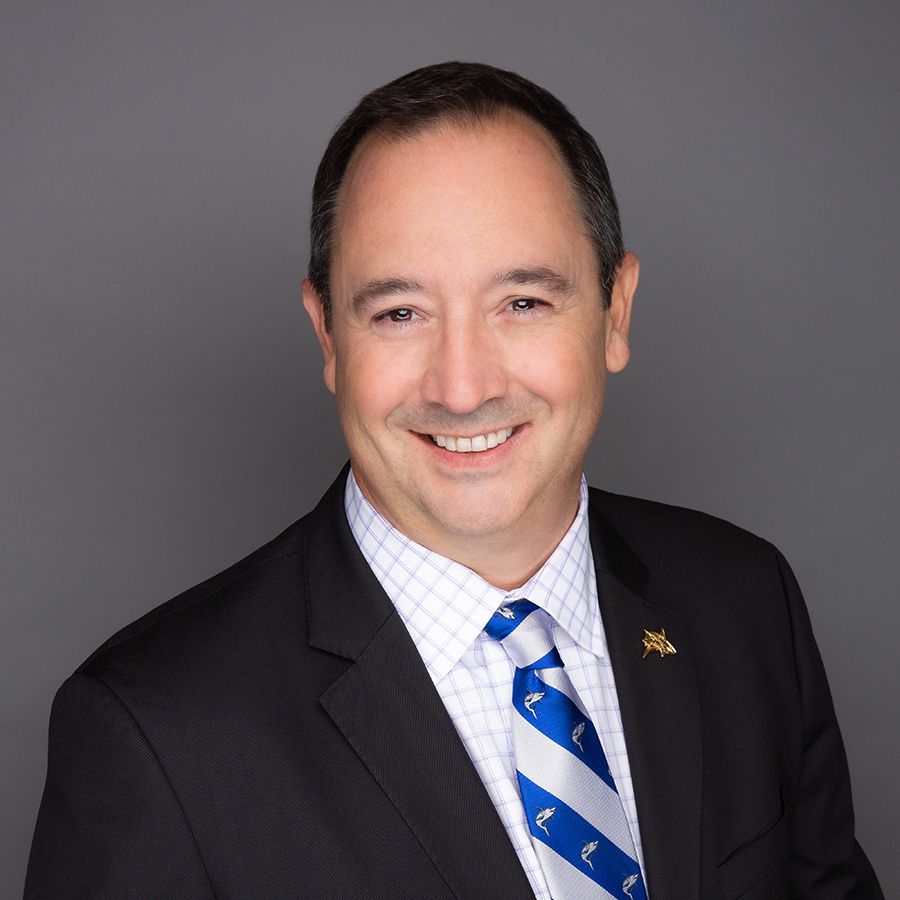
KEN DAWSON-SCULLY, PH.D., M.SC., FRES
Senior Vice President for Research
and Associate Provost
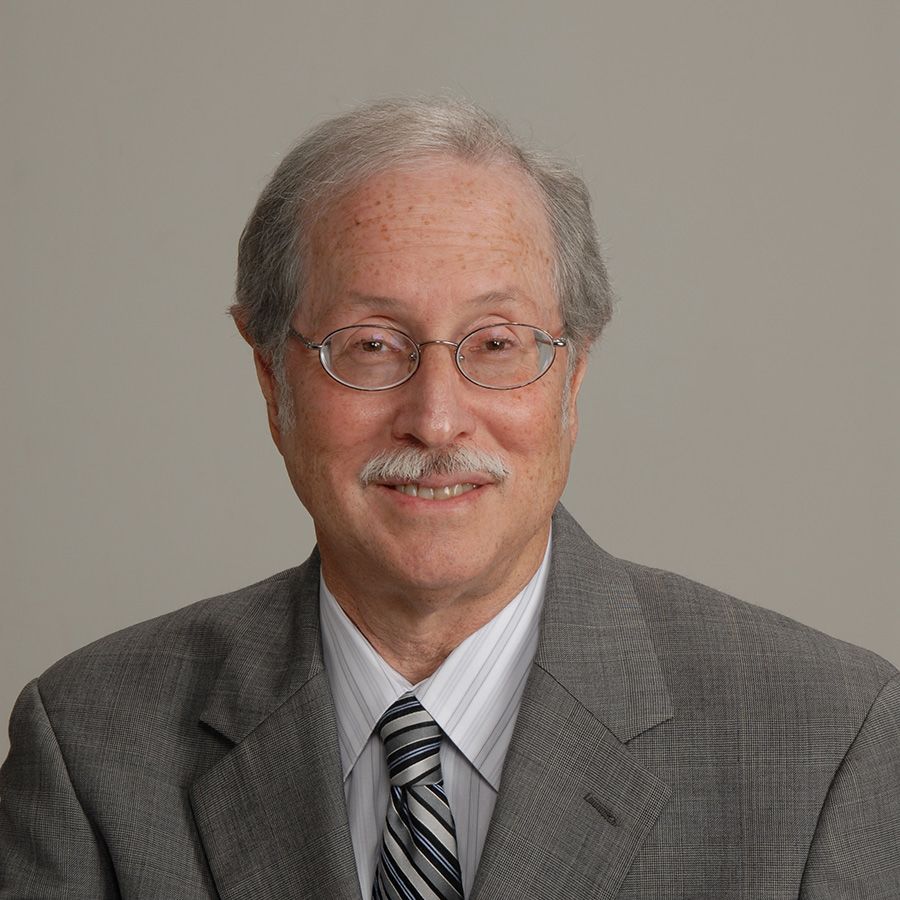
GARY S. MARGUILES, SC.D.
Vice President for Research
SIGNIFICANCE OF R1 RESEARCH DESIGNATION
NSU has reached a coveted milestone in our pursuit of research excellence. The university has been listed by the Carnegie Foundation as an R1 top-tier research institution for its research contributions and doctorate education. This distinction reflects the university’s level of research excellence that has led to more than 400 research/scholarship doctoral degrees awarded in one year across disciplines, including marine science, health care and medicine, cybersecurity, business and entrepreneurship, education, and psychology. This milestone is bolstered by more than $50 million spent on advancing NSU’s research enterprise.
As the largest private research university in the state of Florida, Nova Southeastern University is a hub for real-world impact in the region. With cutting-edge facilities, internationally renowned researchers, and physician-scientists, NSU’s research is saving our seas; pioneering innovative treatments for cancer, ALS, and neuroimmune diseases; and transforming the lives of patients at NSU Health clinics and health care institutes.
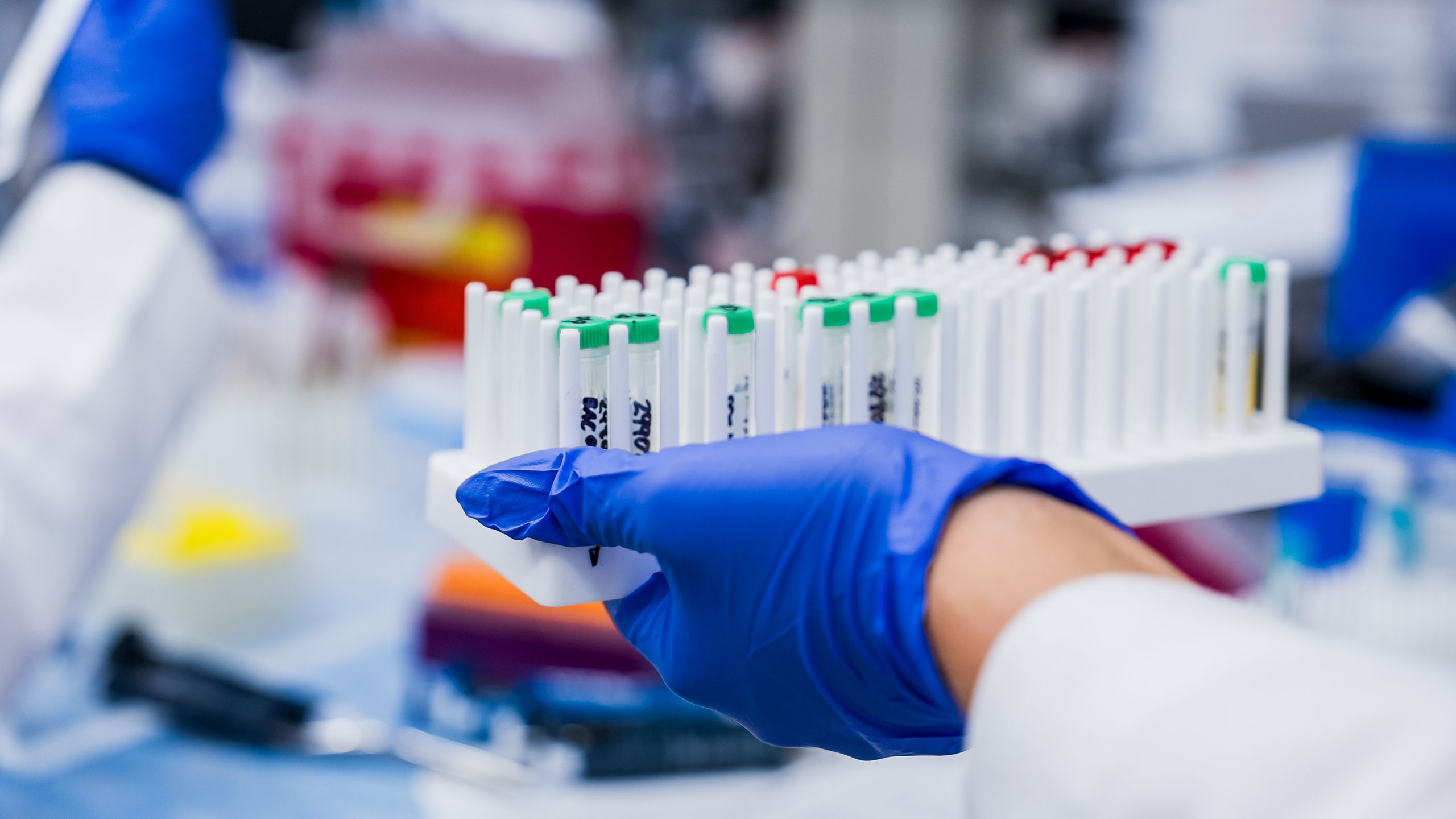
NSU RESEARCH AT-A-GLANCE
422 Research and Scholarship Doctoral Degrees Awarded in 2023
77 Patent Applications
42 Worldwide Patents
23 High-Potential Technologies
NSU Research by the Numbers
For a Young University, NSU’s Research Ecosystem Is Thriving
Private Institution Research and Development Expenditures Ranking
|
Institution |
Rank |
|---|---|
|
Morehouse School of Medicine |
61 |
|
Lehigh University |
62 |
|
University of Denver |
63 |
|
Loyola University, Chicago |
64 |
|
Nova Southeastern University |
65 |
|
Marquette University |
66 |
|
Catholic University of America |
67 |
|
Mercer University |
68 |
|
Chapman University |
69 |
|
Teachers College, Columbia University |
70 |
|
Illinois Institute of Technology |
71 |
|
Villanova University |
72 |
|
Creighton University |
73 |
|
Embry-Riddle Aeronautical University |
74 |
Annual Research Expenditures
FY24 Awards by Funding Source
FY24 Awards by Academic Unit
|
Other Colleges, Centers, and Divisions |
|
|---|---|
|
College of Computing and Engineering |
$8,337,817 |
|
College of Psychology |
$5,366,884 |
|
College of Allopathic Medicine |
$4,868,730 |
|
Levan Center of Innovation |
$4,692,723 |
|
College of Pharmacy |
$4,646,966 |
|
Office of the Provost/Academic Affairs |
$4,105,660 |
|
College of Nursing |
$3,331,621 |
|
College of Education and School of Criminal Justice |
$772,628 |
|
NSU Art Museum |
$704,228 |
|
College of Health Care Sciences |
$550,379 |
|
College of Optometry |
$500,639 |
|
Division of Research and Economic Development |
$290,325 |
|
College of Business and Entrepreneurship |
$192,555 |
|
Honors College |
$100,000 |
|
Library, Research, and Information Technology Center |
$77,322 |
|
College of Law |
$75,000 |
R1 Means Very High Research Activity
The Carnegie Foundation created the R1 classification to distinguish institutions with the highest level of research activity—those investing at least $50 million on research and awarding at least 70 research doctorates annually. Less than 5 percent of the nation’s universities (187 out of nearly 4,000) are ranked R1. With this elite status, NSU is now an even brighter beacon attracting world-class talent and resources to drive research at the highest level.
CARNEGIE DISTINCTIONS
1 of 187 universities nationwide ranked R1
One of eight R1 institutions nationwide designated as Doctoral-Professional Dominant research universities
Awarded the Carnegie Community Engagement Classification
NAMED ONE OF AMERICA’S BEST COLLEGES BY THE WALL STREET JOURNAL
Across its 11 campuses, NSU has more than 22,000+ enrolled students from more than 115 countries and all 50 U.S. states. Our 216,000+ alumni extend NSU’s reach far and wide.

FLORIDA’S LARGEST PRIVATE RESEARCH UNIVERSITY
1 of only 3
U.S. UNIVERSITIES WITH M.D. AND D.O. COLLEGES
#1
LARGEST EDUCATOR OF PHYSICIANS IN FLORIDA
#4
TOP FOUR IN THE U.S. FOR GRADUATE AND PROFESSIONAL DEGREES AWARDED
11
CAMPUS LOCATIONS

WHAT MAKES NSU AN R1 INSTITUTION?
NSU Research Is a Force for Impact
FEATURED PROJECTS OF 2024
More than 250 research projects are currently underway at NSU, from novel anti-cancer therapeutics to coral reef restoration techniques to experimental treatments for veterans with PTSD. These seven highlighted researchers and projects speak to NSU’s commitment to igniting the potential of discovery for a better world, leveraging cutting-edge research to drive impact. Collectively, NSU projects represent millions in funding support and collaboration with 100+ agencies.
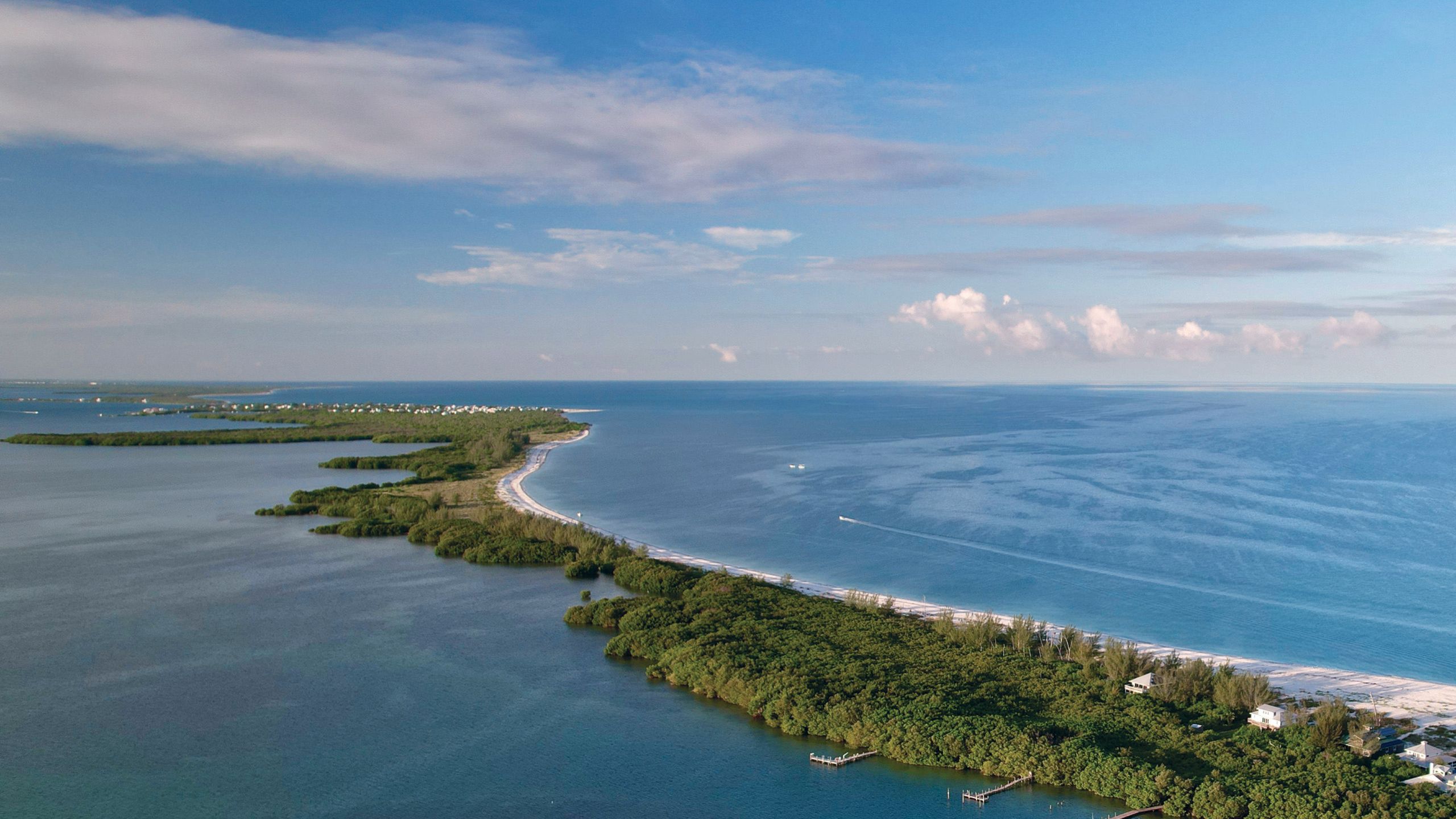
From Flourishing Seas to Healthier Minds
Joana Figueiredo Is Leading Coral Reef Restoration
Joana Figueiredo, Ph.D., and her team at the National Coral Reef Institute have been leading the restoration of Broward County’s section of Florida’s Coral Reef, the only living coral barrier reef in the continental United States and the third largest in the world. Florida has lost more than 90 percent of its coral cover since the 1970s, a significant loss for more than 6,000 marine species that depend on this ecosystem and for the coastal communities that rely on it for storm and flood protection. NSU researchers are working on the revitalization of our reef by producing corals for reef restoration at our land-based and offshore coral nurseries. Figueiredo’s lab has been optimizing the sexual propagation of local coral species. They have reared more than 5,000 baby corals that have been outplanted on our reefs, playing a major role in training others to do the same, a major contribution to upscaling the reef restoration in Florida and the Caribbean.
$679 million
the total economic value of Florida’s coral reefs for recreational diving and snorkeling, as well as recreational and commercial fishing industries
Mercedes Fernandez Is Examining How Bilingualism Powers the Brain
Remarkably, science shows that bilingualism enhances cognitive skills such as attention, taskswitching, and conflict management, potentially strengthening overall mental abilities. With a $699,977 grant from the National Science Foundation, Mercedes Fernandez, Ph.D., is leading a project that leverages the university’s unique access to demographically matched bilingual and monolingual student populations to study how this cognitive enhancement develops. By using electrical measures to examine real-time brain activity, Fernandez aims to reveal how frontal-lobe brain power is strengthened in bilinguals. This work can potentially guide future research and interventions for disorders associated with deficient frontal-lobe processes, such as depression and anxiety.
4.5 years
delay in average dementia development for bilinguals compared to monolinguals

Fueling Innovative Treatment and Access to Health Care
Dmitriy Minond Is Exploring Novel Therapies for Prostate Cancer
As the leading cancer among men, prostate cancer presents complex treatment challenges, particularly for advanced cases that develop resistance to chemotherapy. With funding support from the Florida Department of Health, Dmitriy Minond, Ph.D., aims to address this issue by testing a novel small molecule discovered by NSU researchers against chemotherapy-resistant prostate cancer in mouse models. This research could potentially open up new treatment options for patients with advanced, drug-resistant prostate cancer, improving outcomes for those with limited alternatives.
80 to 90%
the percentage of cancer patients who faced fatal outcomes due to drug resistance
Rachel Coulter Is Examining Gaps in Children’s Vision Care
Early access to vision screenings is crucial for children’s eye health, learning, and development, but socioeconomic factors can lead to screening gaps and setbacks. The latest work of Rachel (Stacey) Coulter, O.D., M.S., FAAO, FCOVD, is a groundbreaking collaborative study of pediatric vision care access in the United States. Published in Ophthalmology, the study determined that lower household income, lower parental education levels, lack of insurance coverage, and primary household language significantly impact a child’s likelihood of receiving vision screenings and necessary eye care. To address children’s health needs, researchers advocate for targeted interventions, including raising awareness, improving data collection systems, and drawing on expertise from health care providers and community partners to increase access to eye care services among these populations.
$35,000
children in households with an annual income below this figure are less likely to receive annual vision screenings
Vladimir Beljanski Is Illuminating Immune Dysfunction in ME/CFS
The estimated 3.3 million Americans living with Myalgic Encephalomyelitis/Chronic Fatigue Syndrome (ME/CFS) experience debilitating mental and physical symptoms, and many may suffer for years without a clear understanding of or treatment for their condition. Researchers are exploring the pathophysiology of this still little-known condition at the cellular level. Vladimir Beljanski, Ph.D., is investigating nanoparticles released from mesenchymal stromal cells called exosomes to understand how they can be used to reset immune cells and energy production in ME/CFS patients. This innovative approach could uncover new insights about the disease and identify targets for future therapies.
90%
the estimated percentage of people with ME/CFS who go undiagnosed by a doctor

A Beacon for Veterans Care
From NSU Health’s Veterans Care services to clinical trials and advanced treatments for diseases affecting the veteran community, such as Gulf War illness, the university proudly serves those who’ve served us, offering accessible and affordable care.

Harnessing Next-Gen Technology for Mental Health and Education
Yair Levy Is Testing Emerging Technologies for U.S. Army Defense Capabilities
Boosting cybersecurity skills and competencies in soldiers is crucial for national security, and generative artificial intelligence (AI) could be a valuable tool to enhance cyber defense in combat. Yair Levy, Ph.D., in collaboration with Catherine Neubauer, Ph.D., at the U.S. Army Combat Capabilities Development Command Army Research Lab (DEVCOM ARL), and a team of researchers are studying how to drive tech-savviness through targeted skill assessments in a cyber range environment. Initial results show significant improvements in cybersecurity competencies when future soldiers use generative AI, potentially helping the U.S. Department of Defense (DOD) to better understand and develop the capabilities needed to protect the nation.
A Collaborative Team Is Exploring High-Tech Treatments for PTSD
Approximately 41 percent of veterans have a need for mental health care once they return to civilian life. In response, researchers are collaborating with the Veterans Trust to develop an innovative mental health care approach for veterans and first responders. The experimental program, led by Dana Scott Mills, Ph.D., in collaboration with Alex Edmonds, Ph.D., B.C.B., Tom Kennedy, Ph.D., and Ryan Bennett, Psy.D., combines a racecar simulator with psychoeducational training to improve quality of life and reduce PTSD symptoms. Once refined and validated, the program could be replicated and offered to facilities focusing on the health of veterans, active military, and first responders.
Fostering the Next Generation in Research
With emerging technologies and complex societal challenges driving change across fields, ambitious professionals require training at the leading edge. A Carnegie-designated Doctoral-Professional Dominant research university, NSU provides advanced resources and research opportunities in medicine, nursing, law, and other disciplines. This unique environment combines higher-level degree programs with innovative facilities, enabling students to pursue groundbreaking research, apply the latest findings, and make immediate real-world impact in their fields.
200+ bed teaching and research hospital opened by HCA Healthcare is integrated with NSU’s research centers and clinical trial programs.
NATIONALLY RECOGNIZED GRADUATE PROGRAMS IN RESEARCH, HEALTH CARE, AND BEYOND
Top Ranked
graduate and professional programs in cybersecurity, computer science, IT, nursing, and entrepreneurship, and recognized by the NSA National Center of Excellence in cybersecurity, cyber defense, and cyber research
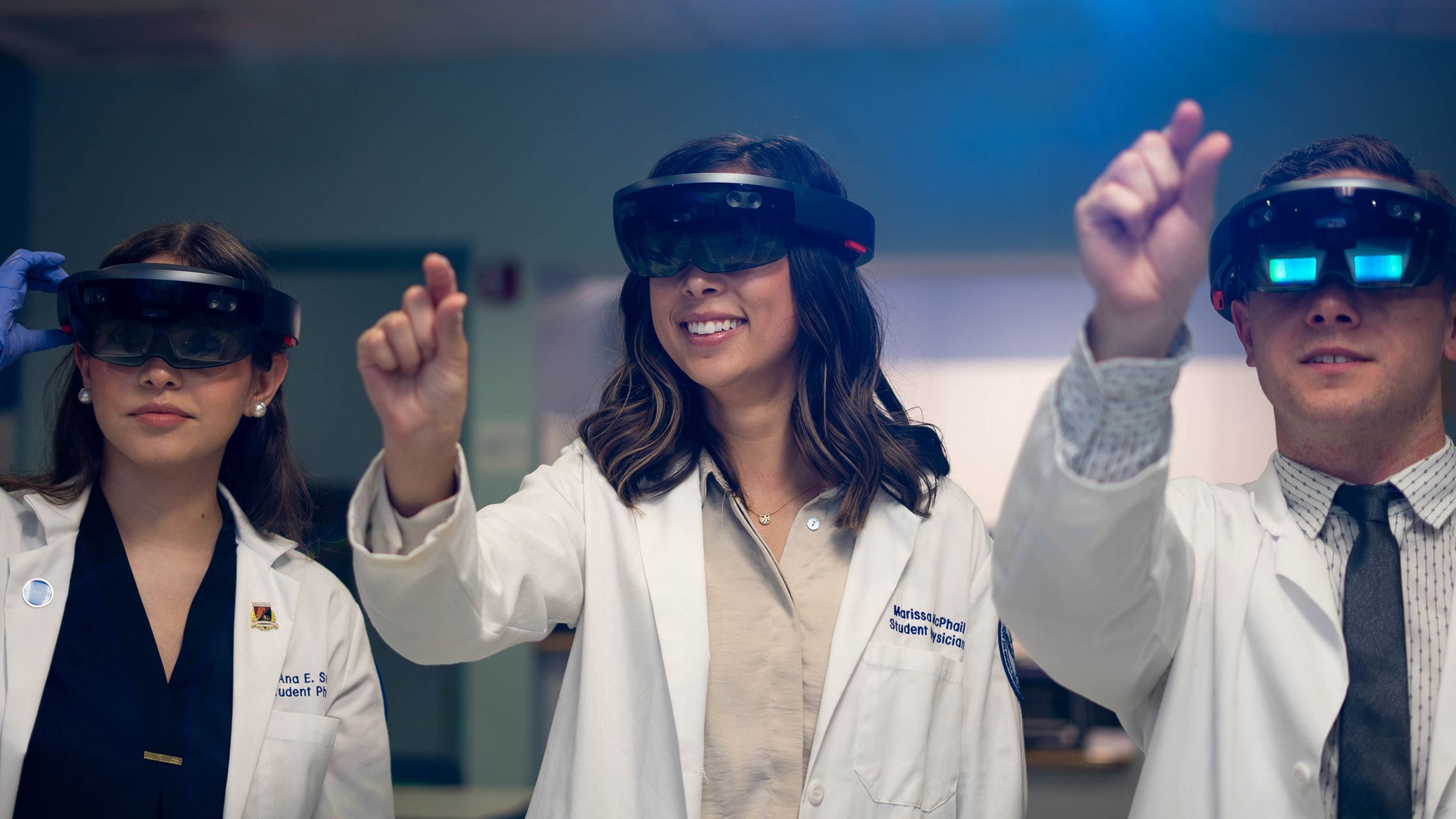
Innovative Spaces and Opportunities for Next-Gen Health Care Professionals
NSU integrates clinical research with advanced professional education across its health care programs—including allopathic, osteopathic, and dental medicine as well as nursing, pharmacy, optometry, psychology, and other health care sciences—through several key initiatives and approaches, such as hands-on experiences in NSU Health clinics and extensive research opportunities guided by faculty.
Advanced Clinical Simulation Lab
With a $500,000 grant from HCA Healthcare, NSU will establish a state-of-the-art clinical simulation lab in support of its new nurse anesthesiology program.
Leading-Edge Equipment
With a $400,000 grant, NSU’s first funds for instrumentation from the National Institutes of Health (NIH) will pave the way for new high-performance lab imaging equipment that will support many of NSU’s basic science research projects.
Growing Research Skills for All Scholars
U-RISE@NSU, funded by the National Institutes of Health (NIH), is a premier training program offering research opportunities to undergraduates in fields like cancer, neuroscience, and drug discovery. The program aims to prepare students for biomedical research-focused higher degrees, with a goal of 80 percent of trainees matriculating into Ph.D. or M.D./Ph.D. programs, highlighting NSU’s commitment to fostering opportunities for advancing scholars in the sciences.
12,500
the anesthesiology workforce shortage we may experience by 2033—a challenge combated by NSU’s forthcoming nurse anesthesiology program
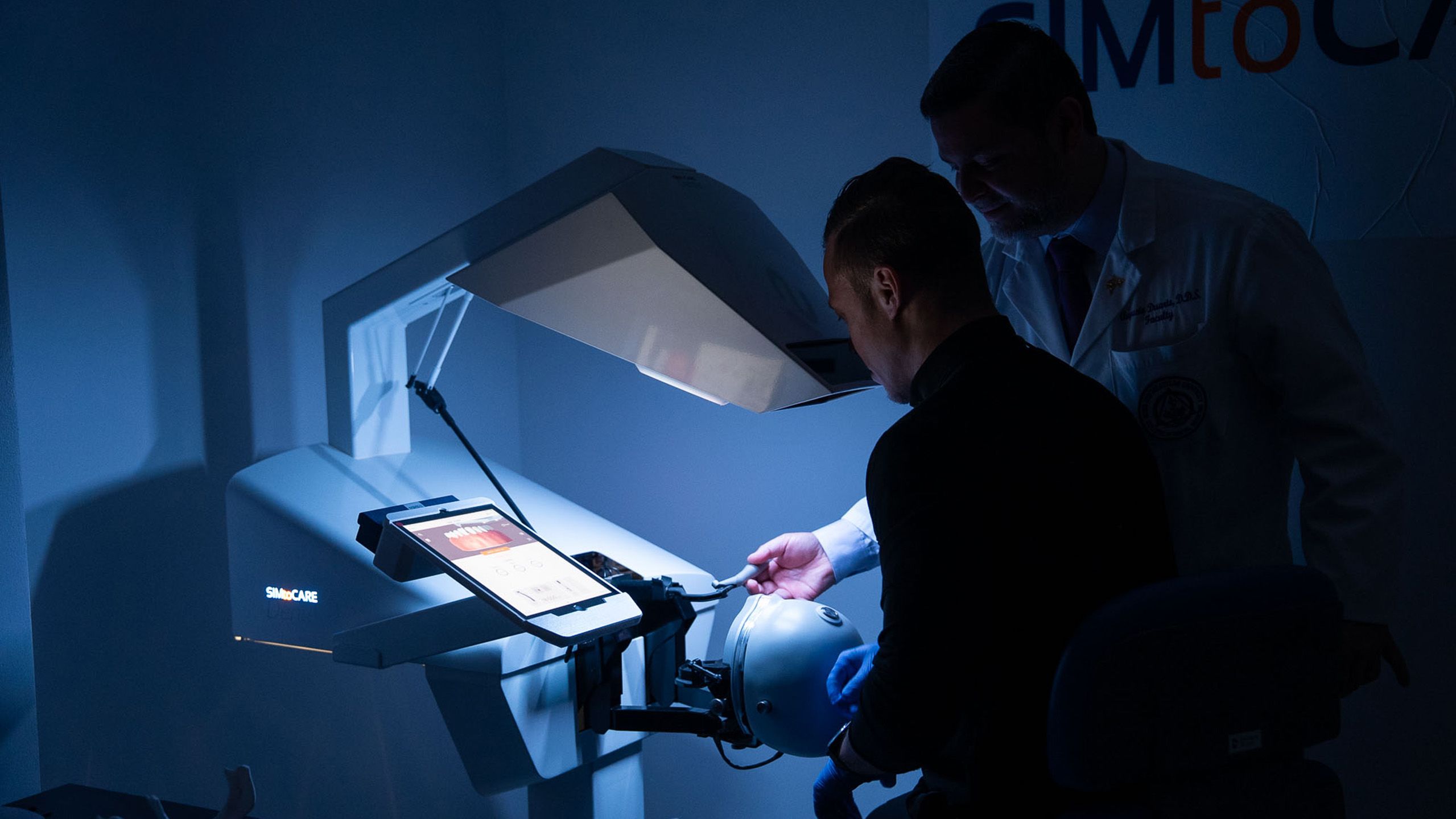
Cutting-Edge Facilities Fuel Discoveries
NSU is home to advanced spaces designed to foster breakthroughs and transformative solutions—and we’re committed to extending access. Our faculty, students, collaborators, and partners benefit from our high-tech resources to innovate and drive research across disciplines.
NSU Guy Harvey Oceanographic Center
With a state-of-the-art, 86,000-square-foot campus for oceanographic research, NSU is leading the way in marine science and resource development for the blue economy. The Guy Harvey Oceanographic Center offers direct marine access to the Intracoastal Waterway, Port Everglades, the open Atlantic Ocean and Florida’s reefs, a coral breeding facility, and more than a dozen labs.
- National Coral Reef Institute
- Save Our Seas Shark Research Center USA
- 12+ marine science labs
- Onshore and offshore coral reef nurseries
Center for Collaborative Research
NSU’s Center for Collaborative Research (CCR) is a 215,000-square-foot, six-story facility equipped with advanced wet and dry labs, high-performance computing environments, and access to Florida LambdaRail, designed to foster interdisciplinary collaboration in health care, bioinformatics, technology, cybersecurity, and business. The CCR houses multiple research institutes focusing on cancer research, cell therapy, neuro-immune medicine, and ocean sciences, connecting researchers, students, and industry partners to develop innovative solutions. At the CCR, research can be directly applied to patient care settings at NSU’s clinics, bringing translation research from bench to bedside.
Core Facilities
Located within the CCR, NSU’s Core Facilities offer researchers, their collaborators, their community and industry partners, cutting-edge resources for advanced research, including flow cytometry for cell analysis, next-generation sequencing for genome analysis, high-resolution imaging for detailed visualization, cell therapy core for experimental treatments, and a vivarium for animal studies.
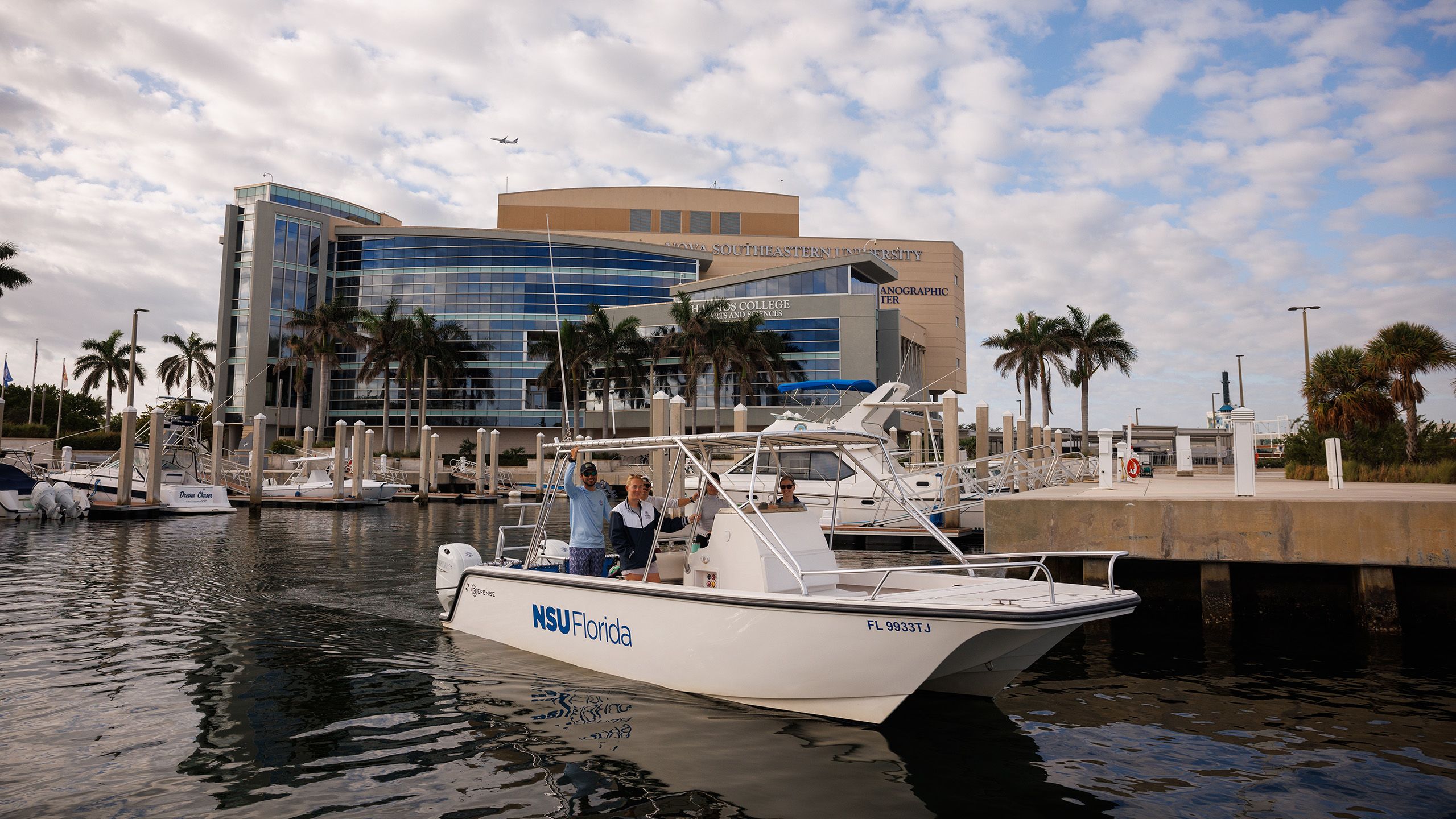
Leading Physician Is Driving NSU Health’s Next Chapter
As the largest educator of doctors in Florida and one of only three universities in the nation to house both M.D. and D.O. colleges, NSU’s robust health care education and research environment is central to the DNA that defines NSU Health’s clinical excellence. This distinction will continue with its next executive vice president and chief medical officer, Chad Perlyn, M.D., Ph.D., M.B.A., who is also the dean of NSU’s Kiran C. Patel College of Allopathic Medicine. A recognized expert in pediatric plastic and craniofacial surgery, Perlyn brings a deep background in health care leadership as a surgical services executive with Nicklaus Children’s Health System. He aims to elevate NSU Health to the forefront of academic health care in the region, with plans to expand its clinical network through strategic clinician and community partnerships, build on NSU’s growing slate of accelerated health care education programs, and continue advancing research opportunities that directly impact patient well-being. Further strengthening NSU’s research enterprise, Candice Sareli, MBBCh, will join NSU in May 2025 as vice president of human research affairs and associate dean of research for the Dr. Kiran C. Patel College of Allopathic Medicine. Sareli brings extensive expertise in clinical research leadership and development, with a career dedicated to advancing ethical and impactful medical research. Her pivotal role in enhancing NSU’s research infrastructure will foster interdisciplinary collaborations and expand opportunities that bridge scientific discovery with real-world health care solutions. Together, Perlyn and Sareli will drive NSU Health’s mission to integrate innovation, education, and patient-centered care at the highest level.
Alan B. Levan | NSU Broward Center of Innovation
The Alan B. Levan | NSU Broward Center of Innovation is a groundbreaking facility supporting entrepreneurship from ideation and incubation to launch and beyond. This 54,000-square-foot space houses cybersecurity training facilities; a makerspace with 3D printers, robots, and an AI lab; high-performance computers; a pitch room; a 3D volumetric capture studio; and coworking spaces—enabling NSU to drive more opportunities for collaboration and innovation.
54,000
square-foot space housing cybersecurity training facilities; a makerspace with 3D printers, robots, and an AI lab; high-performance computers; a pitch room; and coworking spaces
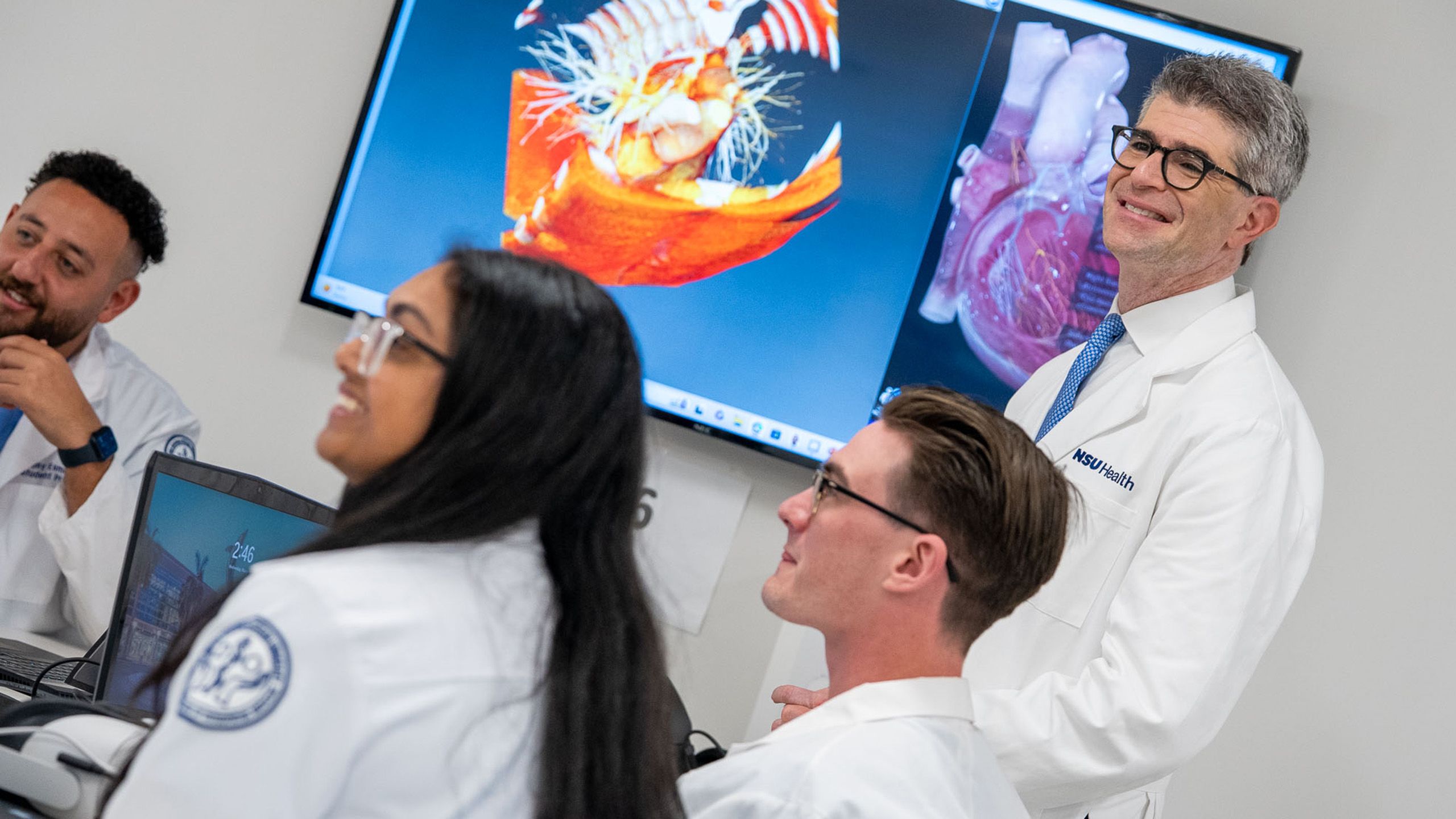
IMPACT OF THE ALAN B. LEVAN NSU BROWARD CENTER OF INNOVATION
200
founders supported
$6 million
In investments facilitated
100+
companies launched
Florida’s ocean reefs are the foundation of a vast marine ecosystem that supports not only ocean life but more than a million jobs and industries ranging from travel to seafood to recreation—a blue economy totaling nearly $800 billion.
With Florida reefs facing devastating die-offs and shorelines confronting rising sea levels, NSU has long played a key role in research and education to support and sustain these crucial natural resources. Researchers are leading efforts to understand how to regrow diminished coral reefs, improve coral reef hardiness, track and study threatened and endangered sharks, and understand the changing dynamics of our oceans.
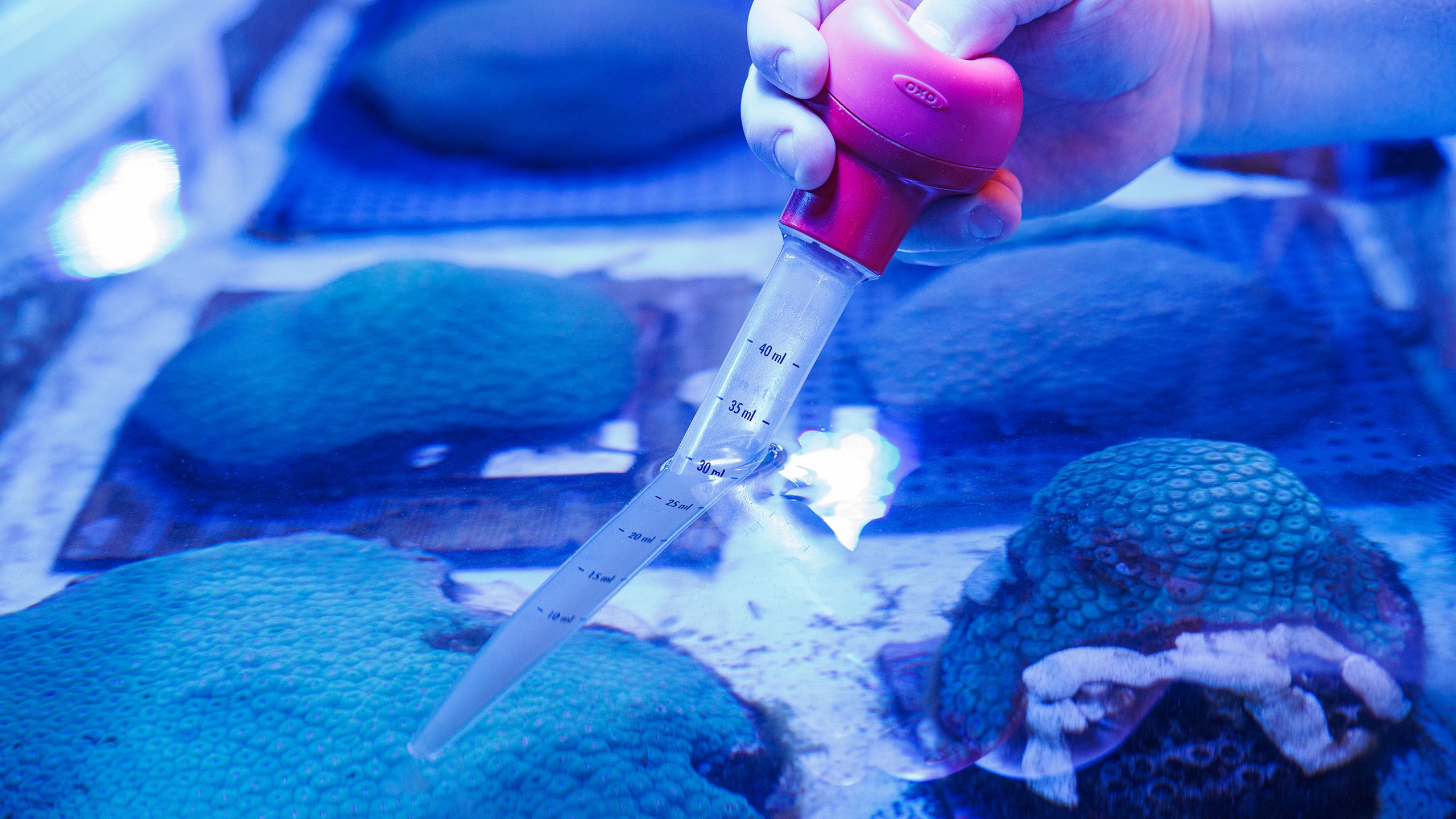
The Next Wave of Ocean Research Begins Here
National Coral Reef Institute
The Guy Harvey Oceanographic Center is a hub fostering cutting-edge collaborative research to improve, sustain, and protect our oceans—and it is also the home of the National Coral Reef Institute (NCRI), established in 1988. NSU was chosen as the location for the Congressionally mandated NCRI because of its remarkable location for coral research and its depth of facilities and expertise. The institute’s one-acre boat basin grants access to the Gulf Stream, the open Atlantic Ocean, and the Southeast Florida reef, and its state-of-the-art labs empower researchers to manage onshore and offshore coral nurseries, rehabilitate damaged corals, and grow new corals to be transplanted at sea.
Operation Coral Rescue Preserves Threatened Species
A major transfer of 300 corals from NSU to Texas A&M University-Corpus Christi, including about 100 genotypes of critically endangered Staghorn coral, made national news in September 2024. As part of a conservation project called Operation Coral Rescue, this effort was one of the largest out-of-state coral transfers by NSU’s Halmos College of Arts and Sciences aimed to support research, restoration, and the creation of a genetic repository for threatened coral species.
$16 Million to Boost Reef Resilience
NSU is part of a collaborative effort with nine other South Florida organizations to enhance the health of Florida’s coral reefs. Funded by a $16 million National Oceanographic and Atmospheric Association grant, the four-year project aims to scale up innovative restoration practices, including breeding robust coral populations and implementing new techniques.
Save Our Seas Shark Research Center USA
Mahmood Shivji, Ph.D., director of Save Our Seas Shark Research Center USA, is applying integrative, multidisciplinary approaches to research and conservation—from high-tech genetics to genomics to fieldwork. This center holistically illuminates shark and ray science and affects meaningful policy changes. With this work, more than 140 shark and ray species have been trade-controlled, regulating more than 90 percent of the shark fin trade.
NSU Coral Research
NSU Coral Research
90% loss of Florida’s coral reef cover since the 1970s
500+ number of sharks tagged
5 ocean research institutes
- National Coral Reef Institute
- Broward County Sea Turtle Conservation Program
- Guy Harvey Research Institute
- Institute for Natural and Ocean Sciences Research
- Save Our Seas Shark Research Center USA
Expanding Advanced Care for People with ALS
A neuromuscular disease with no known cure and with steadily increasing rates of diagnosis in the United States, amyotrophic lateral sclerosis (ALS), also known as Lou Gehrig’s disease, is the focus of researchers at the Cathy J. Husman ALS Center working to better understand and treat suffering patients. Designated as a Treatment Center of Excellence by the ALS Association and led by physician and neurologist Eduardo Locatelli, M.D., the multidisciplinary clinic assembles leading neurologists, speech-language pathologists, physical therapists, respiratory therapists, and other experts to treat and advance the science for this complex disease. Patients experience world-class care, expedited diagnoses, individual treatment plans, and the latest research-backed approaches to slow ALS progression and optimize quality of life.
200,000: the estimated number of ALS gene carriers in the U.S.—four times the approximate number of Americans currently diagnosed with ALS (< 30,000)
“This is a very difficult condition—very complex. It requires assembling a world-class team to deliver the care these patients need with quality and compassion. NSU gave us the opportunity to put that all together.” —Eduardo Locatelli, M.D.
Improving Treatment and Disease Progression with Clinical Research
Certified as a Treatment Center of Excellence by the ALS Association, the Cathy J. Husman ALS Center leads clinical trials where patients can benefit from pioneering treatment techniques. This includes the groundbreaking HEALEY ALS platform trial, which tests multiple experimental treatments simultaneously. Initial results show promising outcomes for reducing mortality risk and delaying disease progression.
Neuroscience Institute Launched with $20 Million Gift
In 2025, NSU’s future in ALS treatment and research was cemented with a transformational gift of $20 million, the second-largest gift in the university’s history, donated by David Husman. This raised his total philanthropic donations to NSU for ALS research to $40 million. The gift marks the creation of the NSU Health David and Cathy Husman Neuroscience Institute, a state-of-the-art destination for ALS research and care, including specialized diagnostic areas, rehabilitation spaces, expansive clinical rooms, and a family consultation suite.
Groundbreaking Research Meets World-Class Clinical Care
Our physician-scientists leading NSU’s health care institutes are some of the most sought-after experts in their fields, translating cutting-edge research to the latest therapeutics and care for patients. The university’s commitment to both innovative research and world-class clinical care experiences makes it a national destination for many seeking help with some of the most devastating, complicated diseases, including ALS, Gulf War illness, Long COVID-19, and cancer.
70+ medical, dental, and psychological clinics connect patients with research-backed treatments, bridging the lab and care settings.
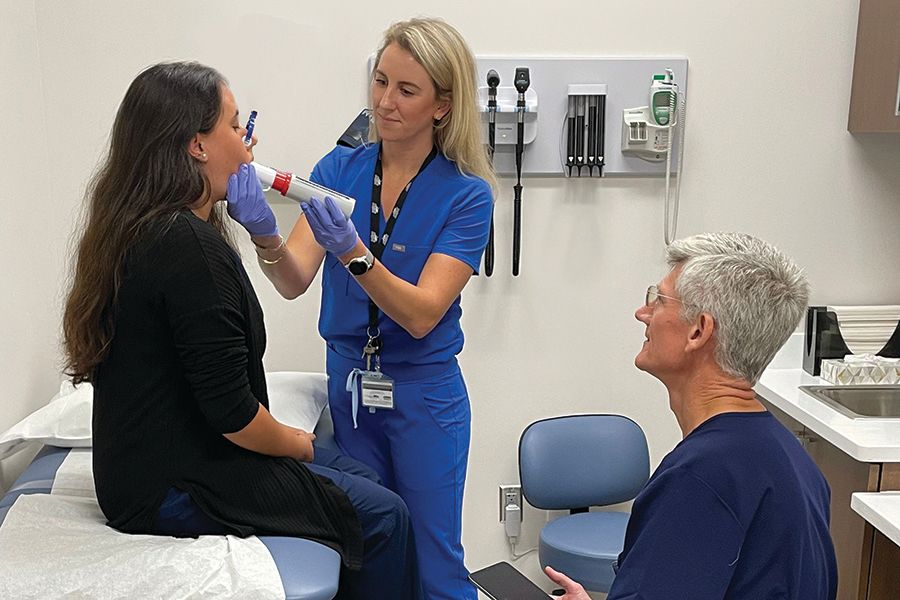
The Next Frontier for Ending Breast Cancer
With approximately one in eight U.S. women facing a breast cancer diagnosis in their lifetime, the AutoNation Institute for Breast Cancer Research and Care aims to eradicate the disease through preventative strategies and personalized medicine. The institute’s experts are conducting comprehensive research—from analyzing environmental risks in South Florida to exploring cancer cell epigenetics and microRNA applications— while integrating genomics, cell therapy, and advanced imaging technologies to develop innovative approaches for prevention, diagnosis, and treatment.
33.2% the rate of advanced breast cancer incidence in Broward County
Investigating Local Risk Factors for Breast Cancer
The rate of advanced breast cancer in South Florida exceeds the national average, a trend that could be linked to factors ranging from socioeconomics to nutrition to the environment. NSU researchers are investigating how environmental factors damage breast tissue DNA, drawing a link between arsenic in local water sources and increased rates of breast cancer.
A Leap Forward for Early Detection
With $963,000 in federal funding from the National Institute of Standards and Technology, NSU’s Barry and Judy Silverman College of Pharmacy will acquire cutting-edge instruments to advance research in genetic predispositions for cancer and early detection.
“Breast cancer is caused by the environment 80 percent of the time. It is considered to be an environmental cancer.” —Jean Latimer, M.D.
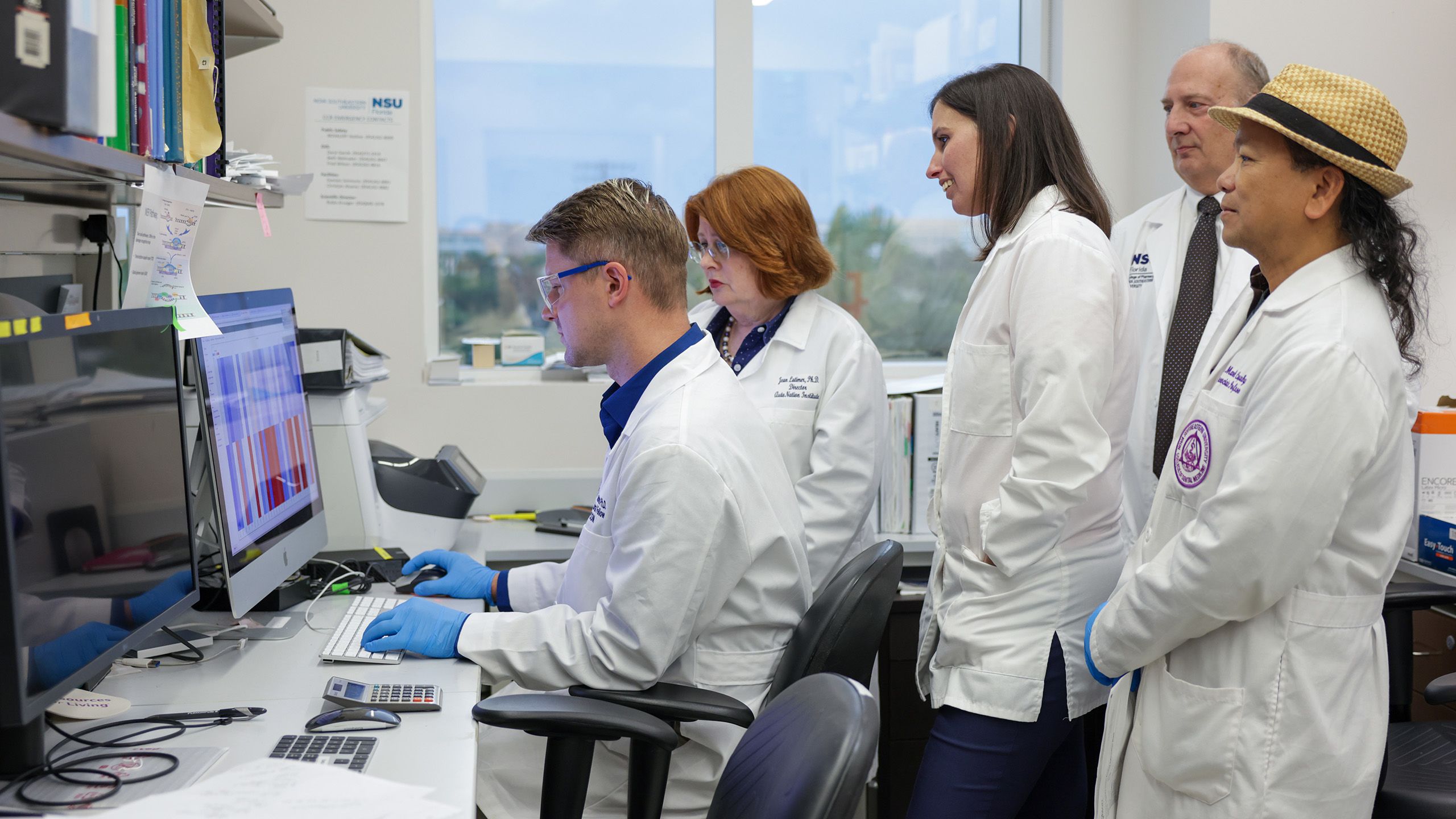
Progressive Approaches to Complex Illnesses
Neuroimmune diseases are a complex group of disorders that affect both the immune and nervous systems, and many aspects of their causes and treatments are still not fully known. Researchers at NSU have long been at the forefront of understanding these multi-symptom conditions, and we continue to pave the way forward. The Institute for Neuro-Immune Medicine (INIM) is a premier center for the study of neuro-inflammatory diseases. Bridging research and clinical care, INIM is bringing translational research approaches to transform outcomes for patients with ME/CFS, Gulf War Illness, and Long COVID.
Studying the Connection Between ME/CFS and Long COVID
In a groundbreaking study, Nancy Klimas, M.D., leads a CDC-funded investigation comparing patients with Long COVID to those with ME/CFS, examining the progression of Long COVID over time in South Florida populations. This research, known as COVID-19: Understanding the Post-Viral Stage, aims to develop a better understanding of this relatively new condition and identify potential treatments by comparing it with similar post-viral syndromes such as ME/CFS.
“We need to understand and describe this new disease, and we’re still in the early stages of learning about it. This study will provide the chance to see patients early on in their conditions, and that’s vital for developing treatments.” —Nancy Klimas, M.D.
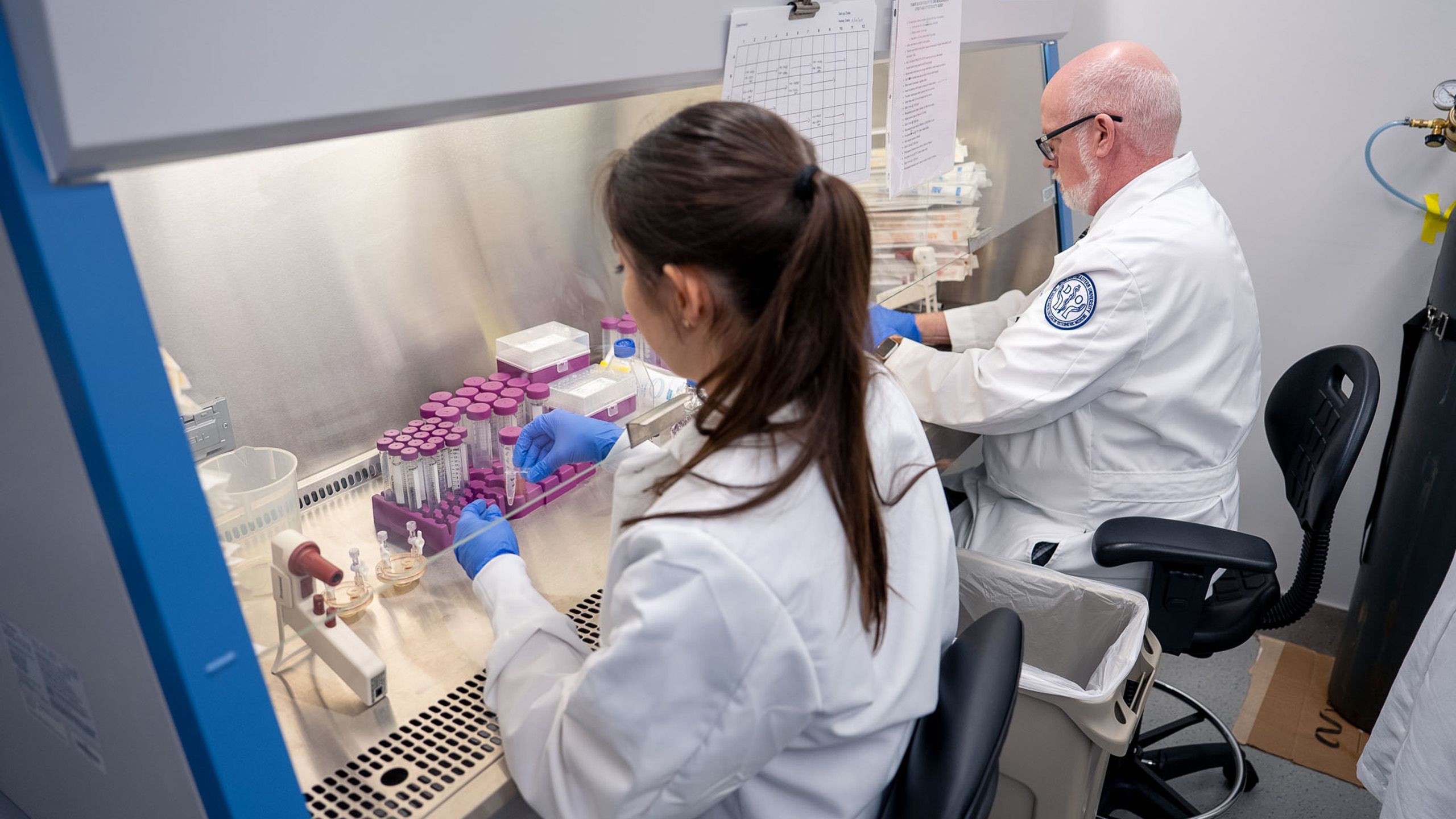
Meet Our R1 Trailblazers
Vladimir Beljanski, Ph.D., an associate professor at the College of Allopathic Medicine and the NSU Cell Therapy Institute, specializes in preclinical therapy development for immune system disorders, focusing on innovative approaches using stromal cells and their products.
Rachel “Stacey” Coulter, O.D., M.S., FAAO, FCOVD, is an associate dean and professor at the College of Optometry who has conducted extensive research on vision and child development, including studies on children with special needs and neurodevelopmental disorders.
Mercedes Fernandez, Ph.D., a professor in the Department of Psychology and Neuroscience at the College of Psychology, specializes in experience-dependent neuroplasticity, focusing on how bilingualism affects frontal-lobe neural inhibitory control and neuropsychological test performance.
Joana Figueiredo, Ph.D., an associate professor and the new director of the National Coral Reef Institute, focuses her research on the marine larval ecology and recruitment of corals and their sexual propagation for reef restoration. Her team established the first spawning hubs in the Southeast Florida Coral Reef Ecosystem Conservation Area to facilitate natural reproduction and study gamete collection.
A renowned physician-scientist, Nancy Klimas, M.D., specializes in neuroimmune diseases, including Gulf War Illness (GWI), ME/CFS, and Long COVID. Her groundbreaking work includes uncovering immune system dysfunctions such as natural killer cell abnormalities in ME/ CFS patients, pioneering combination treatment strategies for GWI, and establishing the medical definition of ME/CFS. She is the founding director of the Institute for Neuro-Immune Medicine.
Jean Latimer, M.D., the director of NSU’s AutoNation Institute for Breast Cancer Research and Care, has pioneered breast cancer research by developing a unique tissue engineering method to grow cells from early-stage tumors and normal tissue. She leads a team investigating environmental causes of DNA damage in breast tissue, advancing our understanding of breast cancer development and potential treatments.
Yair Levy, Ph.D., is a professor of information systems and cybersecurity at the College of Computing and Engineering and director of the Center for Information Protection, Education, and Research (CIPhER) who leads innovative research on the human factor in cybersecurity, including social engineering, risk mitigation, and user authentication.
With deep contributions to ALS research and treatment, Eduardo Locatelli, M.D., has a long history of establishing pioneering programs for neurological conditions, including the Neuroscience Institute at Holy Cross Hospital (HCH) and an Epilepsy Center at Cleveland Clinic Florida, as well as serving as the Incident Commander at HCH during the COVID-19 pandemic. He is the executive director of the NSU Health David and Cathy Husman Neuroscience Institute.
Dana Scott Mills, Ph.D., an associate dean of Research and Strategic Planning and an assistant professor at the Abraham S. Fischler College of Education and School of Criminal Justice, specializes in integrating evidence-based practices in work settings, educational policy, and innovative treatments for veterans and unhoused populations in South Florida.
Dmitriy Minond, Ph.D., is a biochemist specializing in drug discovery for cancer and neurodegenerative diseases. In July 2025, he will be a professor in the Barry and Judy Silverman College of Pharmacy and the Rumbaugh- Goodwin Institute for Cancer Research.
Mahmood Shivji, Ph.D., spearheaded pioneering research that significantly enhanced global shark conservation by developing rapid DNA methods to identify shark body parts, revealing that up to 73 million sharks were illegally traded annually in global shark fin markets and providing the first species-specific trade data. His team’s groundbreaking research on shark genome sequencing demonstrated the genetic basis for cancer resistance and rapid wound-healing abilities in large sharks, and his group’s ecology section studying open ocean sharks’ migrations showed that the shortfin mako (the NSU mascot) is severely overfished at much higher levels than previously realized. He is the director of the NSU Guy Harvey Research Institute and Save Our Seas Foundation Shark Research Center USA and a professor in the Halmos College of Arts and Sciences.

Division of Research and Economic Development
Nova Southeastern University
3300 S. University Drive
Fort Lauderdale, FL 33328-2004
research.nova.edu





